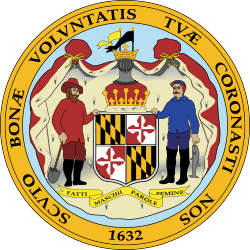| Elections in Maryland |
|---|
 |
Maryland's apportionment was unchanged. It elected its members October 12, 1812.
Contents
| District | Incumbent | This race | |||
|---|---|---|---|---|---|
| Representative | Party | First elected | Results | Candidates [a] | |
| Maryland 1 [1] | Philip Stuart | Federalist | 1810 | Incumbent re-elected. | √ Philip Stuart (Federalist) 98.9% |
| Maryland 2 [2] | Joseph Kent | Democratic-Republican | 1810 | Incumbent re-elected. | √ Joseph Kent (Democratic-Republican) 52.0% Archibald Van Horne (Federalist) 48.0% |
| Maryland 3 [3] | Philip Barton Key | Federalist | 1806 | Incumbent retired. New member elected. Federalist hold. | √ Alexander C. Hanson (Federalist) 60.3% John Linthicum (Democratic-Republican) 39.7% |
| Maryland 4 [4] | Samuel Ringgold | Democratic-Republican | 1810 | Incumbent re-elected. | √ Samuel Ringgold (Democratic-Republican) 53.5% Roger B. Taney (Federalist) 46.5% |
| Maryland 5 Plural district with 2 seats [5] | Alexander McKim | Democratic-Republican | 1808 | Incumbent re-elected. | √ Alexander McKim (Democratic-Republican) 38.0% √ Nicholas R. Moore (Democratic-Republican) 32.7% Peter Little (Democratic-Republican) 29.2% |
| Peter Little | Democratic-Republican | 1810 | Incumbent lost re-election. New member elected. Democratic-Republican hold. | ||
| Maryland 6 [6] | Stevenson Archer | Democratic-Republican | 1811 (Special) | Incumbent re-elected. | √ Stevenson Archer (Democratic-Republican) 99.9% |
| Maryland 7 [7] | Robert Wright | Democratic-Republican | 1810 (Special) | Incumbent re-elected. | √ Robert Wright (Democratic-Republican) 53.7% Samuel W. Thomas (Federalist) 46.3% |
| Maryland 8 [8] | Charles Goldsborough | Federalist | 1804 | Incumbent re-elected. | √ Charles Goldsborough (Federalist) 64.7% Thomas Williams (Democratic-Republican) 35.3% |